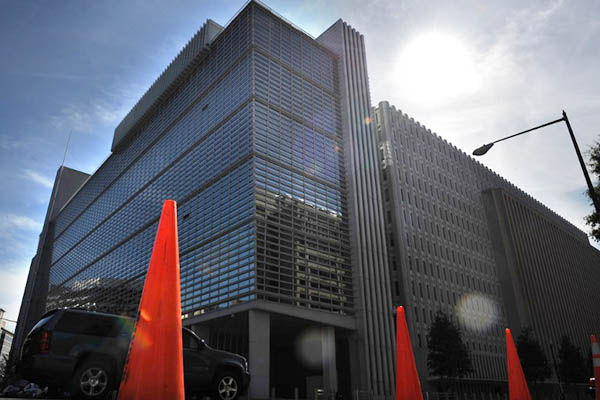
The World Bank headquarters in Washington, D.C. Tim Sloan—AFP
Financing agreement to support Islamabad’s transition to low-carbon energy and help strengthen basic service delivery
The World Bank on Monday announced that its Board of Executive Directors had approved $800 million in financing for the Pakistan Program for Affordable and Clean Energy, and the Second Securing Human Investments to Foster Transformation.
Divided equally between the two programs, the financing arrangement aims to help Pakistan reduce its circular debt and strengthen government infrastructure for healthcare initiatives. The $400 million allocated for the Pakistan Program for Affordable and Clean Energy, read a statement issued by the global lender, focuses on measures to improve the financial viability of the power sector and support the country’s transition to low-carbon energy.
“PACE prioritizes actions needed to initiate critical power sector reforms focused on: reducing power generation costs; better targeting of subsidies and tariffs for consumers; and improving efficiencies in electricity distribution with the participation of the private sector,” read the statement, adding that medium-terms reforms focusing on subsidies, competitiveness, and power sector sustainability were also being developed. “The goal is to reduce circular debt over the long-term,” it added.
“Power sector reforms are critical to resolving Pakistan’s fiscal challenges,” said Rikard Liden, World Bank task team leader for the PACE program. “Decarbonizing the energy mix will reduce the dependence on fossil fuel imports and vulnerability to price fluctuations because of movement in exchange rates. PACE prioritizes action on such reforms, which must be sustained to address circular debt and set the power sector on a sustainable path,” he added.
The incumbent Pakistan Tehreek-e-Insaf-led government has repeatedly sounded alarms over the country’s circular debt, with Prime Minister Imran Khan saying that the money being spent on such payments would be better served for development programs.
The $400 million set aside for the Second Securing Human Investments to Foster Transformation program, meanwhile, seeks to support federal initiatives to help improve health and education services, increase income-generation opportunities for the poor, and promote inclusive economic growth. “Strengthening services that build human capital in a coordinated manner between provincial and federal authorities, along with improved targeting of social safety nets, will better support families to recover from the COVID-19 crisis, and pave the way for more robust crisis preparedness in the future,” said Tazeen Fasih, World Bank task team leader for the SHIFT II program.
SHIFT II reforms, said the World Bank statement, increase budget reliability for sustainable financing of child immunization and quality primary healthcare programs; promote student attendance, especially for children out of schools due to COVID-related closures; and support data-driven decision-making.
“The program supports reforms to encourage women’s participation in the economy by improving working conditions and empowering those in the informal sector. It supports the enhancement of national safety nets programs and better targeting to protect the most vulnerable, building resilience to shocks like the COVID-19 pandemic,” it said.
“The reforms underpinning PACE and SHIFT can contribute to facilitating sustainable investments and generate welfare gains for those most in need,” said Najy Benhassine, World Bank country director for Pakistan.
Pakistan has been a member of the World Bank since 1950, and has received $40 billion in assistance during the past 70 years. The World Bank’s program in Pakistan is governed by the Country Partnership Strategy for FY2015-2020 with four priority areas of engagement: energy, private sector development, inclusion, and service delivery. The current portfolio has 57 projects and a total commitment of $13 billion, added the global lender.
